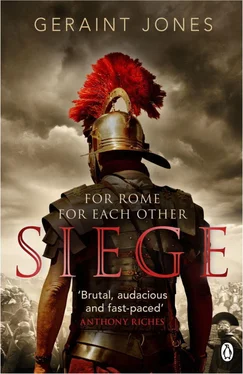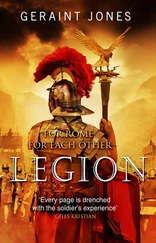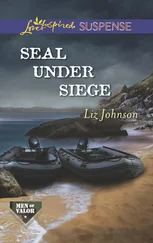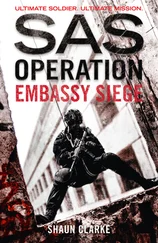‘You his mates?’ a bloodied surgeon’s assistant asked us as he emerged for air.
‘His section,’ Stumps answered. It was a good answer. We all sensed that Balbus was a good man, but we had not lived and breathed beside him long enough for him to become family.
‘He’s alive,’ the man told us, with no trace of happiness at that fact. ‘Bled a lot, though. Prepare yourselves for the worst.’ He shrugged as he ducked back inside the building.
‘Not a word,’ I told the men, seeing Stumps and Brando on the verge of self-reproach and recrimination. ‘Not a word ,’ I forced again. ‘We wait.’
And so we did.
The night had long settled before a slave appeared from the hospital and summoned our huddled figures inside.
The copper tang of blood hit my nostrils as we were led into the candlelit building. We passed the open door of an operating room and saw a slave on his knees, scrubbing away what must have been the blood of our comrade.
‘In here.’ The first slave gestured, and we entered an open ward of beds. Only two were occupied. Standing next to Balbus was a man whose once red hair was losing the fight with white. He introduced himself as Balbus’s surgeon. Though not unfriendly, the man’s tone was clipped and dispassionate, a necessity of his profession.
‘He won’t make the morning.’ The surgeon confirmed what I already knew. One look at Balbus had been enough to tell me that the soldier was on death’s door. His skin was grey and waxen, like tent canvas. Despite the thick blankets about him, he looked cold to the touch.
‘Lost too much blood in the operation,’ the surgeon explained. ‘Had to take the whole arm. There’re not many who come through from that.’
It was Micon who spoke. ‘Thank you for trying, sir. We know you did your best.’
The surgeon gave a curt nod. ‘Stay as long as you like.’
I watched the man leave. Then I felt Brando’s eyes on me.
‘This isn’t our fault,’ I said to him as he placed his hand on Balbus’s shoulder.
But the Batavian ignored my words. ‘I’m sorry, Balbus. This is my fault. I’m sorry.’
‘Is there nothing we can do?’ Micon ventured.
‘Sure. Donate him your arm,’ Stumps lashed out, regretting the insult instantly. ‘Sorry, Micon.’
The youngster shrugged. ‘It’s all right.’
‘What do we do?’ Stumps asked me then. ‘He must have other mates here? He was Nineteenth Legion a long time. They’ll want to see him off, won’t they? He’s a good bloke.’
He was right. ‘Half the garrison’s on the walls,’ I answered, ‘the other half’s asleep. The centurions will have runners posted at their quarters, though. Try them. It’s the least we can do for him.’
‘All right,’ Stumps agreed, turning to Micon. ‘You come with me.’
‘You too, Brando,’ I told the crouched figure.
‘I want to stay with him,’ the man protested. ‘This is my fault.’
‘Go and get his friends,’ I said. There was no room for argument in my tone, and not long after my friends had departed did the reason for that forcefulness walk into the ward.
‘Sir,’ I greeted Centurion H.
‘Felix.’ Framed by candlelight, I saw nothing but sorrow and dread in his features. Hard to believe this was the man who had worn his humour so openly.
‘I sent the others away,’ I explained. ‘I thought you’d come here.’
‘Balbus was – is – still one of mine,’ H agreed, coming to stand beside the bed and looking down at the unconscious soldier. ‘Was one of mine when he was hurt, anyway. Can you believe a splinter did this to him?’ There was as much wonder as grief in his voice. ‘A fucking splinter, and a good man’s life is over.’
‘There’s no reason in death, sir,’ I offered, having spent years searching for it. If I was honest with myself, I was still looking.
‘Maybe it’s a blessing.’ H seemed to be trying to convince himself. ‘I just came from a briefing with the prefect. Rations are to be cut again from tomorrow. I’d actually forgotten I had ribs.’ The man attempted to smile.
I liked this officer. Shame burned me for what I had done in his sight, and the desire for his approval pushed me to speak. ‘Better hungry stomachs than the Germans, sir,’ I said, and that was true – cavalry scouts aside, there had been no sighting of a body of enemy troops for weeks. Neither had there been any sight, or even word, of our own.
‘They won’t leave the Rhine.’ H’s words mirrored my thoughts. ‘They’d be mad to. Three legions gone, Felix. We’re on the defensive now. There’s no need for forts on this side of the Rhine. We’re the dregs of Varus’s barrel, and we’re not worth scraping out.’
I tried to find some ray of hope. ‘A lot can happen in a few months.’
The centurion shook his head. ‘We don’t have a few months. Could we split the rations down further, and make it through winter like skin and bone? Maybe. But the fort will pull itself apart before that, Felix. There isn’t a united group here. Everyone’s in it for themselves.’
I shrank a little with shame at the man’s words.
H saw my disgrace. ‘I don’t blame anyone for it,’ he told me, and I could hear his honesty. ‘Arminius did more than win a battle, didn’t he? He wiped out three legions , Felix, and when he did that, he pulled away the blindfold. We know that we’re not invincible any more. There’re fewer than a thousand of us here, and Varus had more than fifteen! Why should anyone believe we can come through this?’
Did he hope that perhaps I, a survivor of that massacre, would have an answer for him? ‘There’s always hope,’ I said, but my voice was weak.
H looked down at the dying form of Balbus. Resignation was etched into the centurion’s face, this man who had been so full of life and purpose. Like Balbus, he had given up his own fight. When he spoke, his words were soft, but as lifeless as rock.
‘Hope died in the forest.’
Soon after, Balbus followed in its wake.
Balbus wasn’t the only person to die in the fort that night. The other was an aged civilian who had lived outside of the camp since its construction, but sought refuge inside when the rumour of war had spread. Linza told me this as we walked away from the graves. We were outside the walls; our enemy was distant enough to spare us the necessity of having to bury the dead alongside the living.
Linza shrugged. ‘The old die first, in times like this.’ There was experience in her voice, and I did not wonder at that. Lean times and famine were commonplace in the world. Blighted crops could starve a family as well as any besieging army.
‘It just doesn’t seem real this, does it?’ she asked me as we stopped ahead of the open gate, savouring the promise of freedom of movement, and choice.
It was an illusion.
‘The cavalry beyond that wood-line are real enough,’ I told her. ‘There’re not many of them, but enough to stop what you’re thinking.’
She shook her head, pushing a strand of dirty blond hair from her face. ‘I’m not trying to leave this place, Felix. Not like that. Better hungry than dead.’
We walked beneath the gateway. Some three dozen had attended the funeral of soldier and civilian, and now the thick wooden gates were closed behind us. There was a fatalistic finality as the heavy locking bar was dropped into place.
‘Funny, isn’t it?’ Linza smiled wryly. ‘That we only get to leave the walls for death? Either raids, or burials.’
‘I hadn’t thought about it.’
She laughed a little at that. ‘It’s all you think about,’ she teased me lightly.
But the woman was wrong. Perhaps my mind had orchestrated its own successful defence of a siege – a siege of horrors and hopelessness – because for the first time in months I was sleeping without nightmare. I was waking without screams.
Читать дальше











